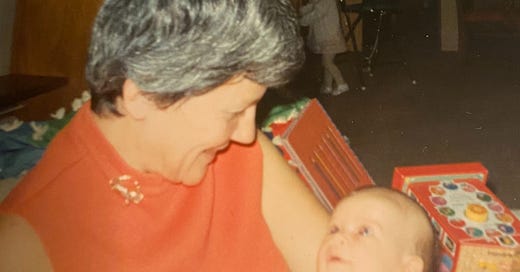This time of year, especially, a lot of people I work with feel confused about love. They are confused about their parents or the people who raised them.
“I know they love me,” they might say, “I don’t know why I feel so resentful.”
Or, “They love me, so I have a duty to go home.”
And when I ask them to paint me a picture of their parent or caregiver, so often the picture is one of a parent unable to consistently love, or unable to love at all. Whether they were abusive or neglectful, purposeful or passive, depressed or narcissistic, suffering their own attachment trauma - we live in a world where lovelessness prevails in secret, in nuclear households, in shame-based religions, in the violence of patriarchy. In this repressed, oppressive world of emotional immaturity and denial. It is easy to get confused about love.
What is love.
In bell hook’s groundbreaking book All About Love, she helped reframe love from being a feeling, to being an intention and an action. I remember reading the beginning of her book and being devastated by her statement that love can not exist within a context of abuse. There was abuse in my family so did that mean I was not loved? I wanted to have been loved. I wanted to return to a condition of love. Over time, I realized it is not that simple. I believe that love is something that is in constant movement. There may have been years when I was loved more often than not, years when love was absent, years when there were moments of love, and I tried to interpret those moments as universal, and that led to confusion.
Love is not longing. Love is not wanting the best (as you see it) for someone. It is not a desire to control. An attachment bond does not equal love.
Love requires a certain amount of ability to differentiate between oneself and one’s loved one.
One of my favorite exercises to do with people I work with, is to imagine their parent or caregiver off in the distance. It might be down the block or in a different state, or off on the moon. Imagine that the parent has all the support they need, and you don’t need to know what that is. They may be surrounded by angels, or animals or ancestors, that is not for you to know or figure out, but you can see them and they don’t need anything from you. There is your parent or caregiver off in the distance, and between you and them is a river. Then as you hold this image, put one hand up to your own heart, and one hand out, arm extended, hand up like a ‘stop,’ and say out loud “This is me” focusing on your hand on your heart, and then bringing attention to your outstretched boundaried hand “that is my parent (mom, dad, grandparent, whatever you call them),” and then back again to the hand on your heart, “this is me.”
And then pausing, really letting yourself take in the self-hood of you. Your body, the space around you, your breath, your posture, any movement you might want to make.
Repeat 3X, until it feels a bit matter-of-fact.
And again whenever the confusion comes.
Duty
I like to describe duty as something that is completely unrelated to love. Duty is a cultural, possibly religious, moral or spiritual thing. Your culture and morality may or may not be different from your parent/s. Whether or not you owe someone your time because they fed you after they chose to bring you into or up in this world, that is a decision for you to make, but has nothing to do with love.
Emotionally immature parents
Most parents and caregivers want to love their children, but many don’t have the emotional maturity to even begin to try to understand the emotional experiences of other people, including their own children, as Lindsay Gibson writes in her book Adult Children of Emotionally Immature Parents: How to Heal for Distant, Rejecting, or Self-Involved Parents.
I really appreciate this book, including one of the final chapters that includes tips on how to have adult connection with an emotionally immature parent - like having a detached, observational approach, having communication but no goal of having a satisfying emotional exchange.
Presence.
I love Daniel Siegel’s books and how learning to parent is also learning to love. He talks about love from a brain scientist way, in the most easy to understand language, because he wants everyone to get it.
In child-parent relationships, the child should be seen, soothed, and made to safe enough to cultivate security. A loving parent honors differences and promotes connections.
Love is about presence. It’s about how you hold the space with wonder and awe, witnessing another’s growth and experience in the world around them.
I have a lot more to say, but will leave it here for now.




